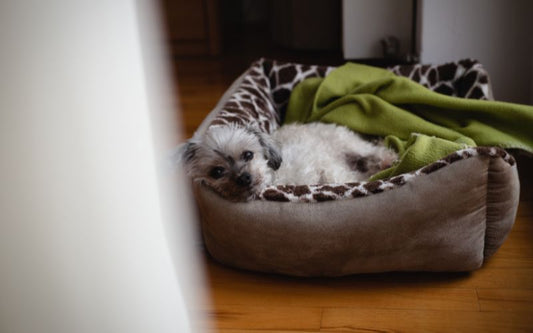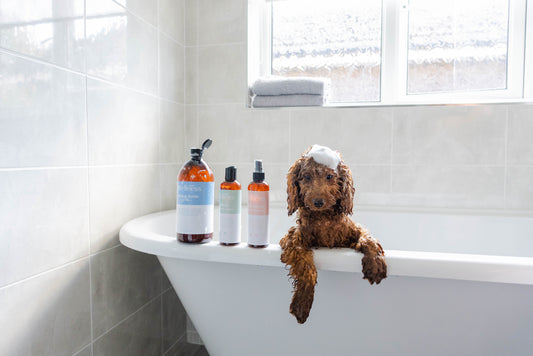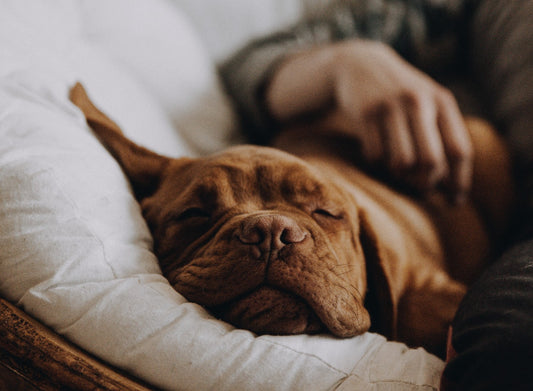If you’ve just welcomed your puppy home, then make the most of your little bundle of fluff, because before you know it they’ll have doubled in size and you’ll be heading out to buy a new collar!
Puppies grow up really fast, but when do they officially become an adult dog?
Continue reading to discover when a young dog is no longer considered a puppy, and learn a little more about the different stages your dog will grow through.
Puppy Growth Guide:
- At what age is a dog no longer a puppy?
- How long is a dog considered a puppy for food?
- When do puppies stop growing?
- The life cycle of a dog:
- What age is an adolescent dog?
- When is a dog considered an ‘adult’?
- How long do dogs live?

At what age is a dog no longer a puppy?
If you’re anything like us, you’ll probably continue referring to your dog as a puppy until they’re old and grey! But generally speaking, a puppy is officially considered an adult dog between the ages of 1 - 2 years, once their bones have fully developed and they’ve reached their final height and size.
If you have a smaller breed, they’re likely to be fully grown by the time they’re 8 - 12 months old, whereas a large breed (and especially a giant breed) can take a lot longer to fully mature.
How long is a dog considered a puppy for food?
When it comes to food, puppies have a lot more energy than older dogs and therefore need a few extra calories to fuel their mischievous growing phase.
Puppy food helps to ensure that your pup gets the right intake through smaller meals, while also including the nutrients they need to fully develop and grow.
It’s important to always pick good quality food that is rich in protein and healthy fats to support your puppy’s growth and keep them healthy.
Once your puppy stops growing, you can switch to adult dog food. In general, this will be around 8 - 12 months for smaller breeds, around 12 months for medium breeds, and anywhere between 10 - 24 months for large or extra large breeds.
Opt for nutritionally-balanced food so your young adult gets the energy they need (without putting on extra pounds!), and introduce them to their new food slowly over the space of a week. This will help their bellies adjust and prevent them from getting an upset tum.
When do puppies stop growing?
Puppies develop at completely different speeds and nobody can predict exactly when a puppy will stop growing, but their breed can give the best indicator and may be the most important factor to consider.
- Breed type: A small breed, such as a Dachshund, has a lot less growing to do before reaching its adult size, so it will be classed as an adult dog way before larger canine friends, such as Golden Retrievers or Labradors.
- Biological sex: Another factor to consider is your puppy's sex. A female dog reaches maturity faster than males, but they also tend to be smaller, so they’ll be fully grown first too.
You need to keep a close eye on your puppy's accessories as they continue to grow. It's important to regularly check their dog collar to ensure it still fits correctly, and that you're able to fit two fingers between the collar and their neck.
When is a puppy fully grown?
A puppy is fully grown once they’ve reached maturity and their bones are fully developed. This can be anywhere between 8 months and 24 months, depending on the dog breed.
If you’re unsure of your pups breed, or you’ve rescued a mixed-breed and don’t know much about their parents, you could take a glance at their paws to gauge whether they’ve finished growing.
Generally speaking, their paws should be proportionate to their body size to help carry their weight. So if your pup is still bounding around with gigantic paws, then they likely have some more growing to do!
This isn’t always a reliable factor though, so your best bet would be to speak with your vet to see if they can recognise any traits that could help work out your pups lineage or age.
DNA tests can also be great for predicting your pups adult size as they uncover your pup’s breed makeup, helping piece together another part of their story.
What age do dogs stop growing?
| Breed | Growth Period |
| Small breeds (adult weight of up to 10kg) | 8 - 12 months |
| Medium breeds (adult weight of 10 - 22kg) | Around 12 months |
| Large breeds (adult weight of 22 - 45kg) | 10 - 16 months |
| Giant breeds (adult weight of 45 - 90 kg) | 18 - 24 months |
The life cycle of a dog:
There are four stages to a dogs life cycle; puppyhood, adolescence, adulthood and the senior years.
As we’ve already mentioned, smaller breeds mature faster than larger dogs, and they’re more likely to live longer. But this does vary from dog to dog, depending on genetics, quality of nutrition and the care they’re provided with throughout their lives.
1. Puppyhood:
This is the stage where they learn everything they need to know about life in the big wide world.
Typically, the first 8 weeks of a pup's life should be spent with their mum and siblings, ensuring they receive the love and nutrients they need to grow before heading off to their new home.
During puppyhood, they will learn to interact and socialise with humans and other pups, and how to act in their new environment through house training and basic obedience training.
This is also the stage where you should fully vaccinate your puppy, giving them the best protection from nasty viruses so he or she is ready to continue learning and growing into a healthy and happy dog. Before taking your puppy for its first walk, make sure they have had their first and second rounds of vaccinations.
2. Adolescence:
The stage where their hormones kick in and your patience may be tested!
Puberty can start between 6 - 18 months of age, depending on your dogs breed, and it may bring with it selective hearing and ‘teenage’ behaviours.
During this period, any previous training will be forgotten, or simply ignored, but it’s really important to persevere and keep teaching them through gentle and consistent methods to avoid a second ‘fear’ period and continue building their confidence.
This is the stage where female dogs experience their first season (heat) and male dogs may start to show more interest in scent marking and excessive sniffing. It’s the stage where you should consider getting your dog spayed or neutered, but always consult your vet first for their recommendations.
3. Adulthood:
When a pup has fully matured and grown into an adult dog.
Typically, this stage starts at around 18 months for smaller breeds and anywhere up to 3 years for larger breeds.
By the time they hit adulthood, they will have reached emotional maturity, and that abundance of puppy energy should have levelled out.
The early training put in through the first two stages of their lives will be paying off, and by now, young dogs should be fully house trained and know the positive behaviours you expect from them.
They’ll still have plenty of energy to play and explore the world with you.
4. Senior Years:
The final stage and the ‘golden years’ of your dogs life.
Often beginning around 7 - 10 years, this is the stage most larger sized breeds reach earlier than those much smaller than them.
In these years, dogs tend to enjoy a much slower pace of life - eating less and sleeping more, much like us humans! You’ll notice their muzzle will start to grey too.
Their senses may start to weaken and they might experience joint or dental issues among other health concerns, so it’s important to stay regular with your vet visits.

Please include attribution to https://www.barclondon.com/ with this graphic.
Top Tip: If you’re curious to know which stage of life your dog is likely to be in and can’t tell from the signs, try a dog calculator. Not only will it suggest the stage, it will also tell you their age in human years, and who doesn’t want to know that?!
What age is an adolescent dog?
Adolescence in dogs can start between the ages of 6 - 18 months, marking the change from puppy to adult and beginning the ‘teenage’ phase of hormones and mood-swings!
The specific age will differ from dog to dog, but you can use their breed to help predict when to expect it.
How long does dog adolescence last?
Dog adolescence usually lasts for a year, and depending on your dogs breed it will pass by the time your pup hits the age of 18 - 24 months.
Adolescent dog behaviour:
During this stage of your dogs life, there are a few common adolescent dog behaviour problems that you may face, but with training and perseverance they can usually all be overcome.
- Rebellion: Your dog will likely ignore all previous training as they become more motivated to explore and interact with their environment. Adolescent dog recall can become challenging as their brain is being flooded with natural internal instincts that override their previous recall training. If you experience this change, try using a long line attached to their harness so you can give them the freedom they desire but still have the security of control.
- Excessive sniffing or humping: Their hormones are starting to kick in so it’s only natural to experience a few behaviour changes. You may notice their desire to scent mark increases, and the humping begins as puberty takes over. Although most common with male dogs, female dogs may also start humping while they’re in season.
- Territorial behaviour: Another common change is dogs is that they start to become more protective - whether thats guarding their favourite toy, or barking at things that didn’t previously bother them.
- Increased anxiety: During this stage it is normal for puppies to experience a second ‘fear period’ so don’t be surprised if your once confident puppy isn’t so brave anymore. It’s nothing to worry about, but it is important to stick with their training and keep building their confidence. Stay calm and consistent, and keeping things predictable for your pup. For female dogs this can be especially noticeable during their season.
- Social behaviour: Keep an eye on how your dog interacts with others during this period as they may become easily distracted when other dogs are around, playing a little more boisterously, or simply loose interest in other dogs altogether and become less social. If you notice things getting out of hand, distract your puppy away by interrupting them and start a new game with you instead.
Want to work on your adolescent dog training? Have a go with some scent work by hiding treats or toys and getting them to use their nose to sniff them out. This can be done at home, in the garden, or even out on walks.
It’s a great way to make sure your pup gets the stimulation they need while sticking to the recommended exercise for their age.
When is a dog considered an 'adult'?
Once you and your puppy have completed puppyhood and adolescence, it’s safe to say you have successfully raised an adult dog.
That little ball of puppy fluff will have developed fully, and they will now look (and hopefully behave) like a grown dog. But don’t worry, those puppy dog eyes won’t loose their sparkle!
Although adult dogs are considered ‘easier’ to care for than puppies, they’ll still need your love and support.
Keep your dog’s exercise consistent and make sure they’re getting the correct amount so they maintain a healthy weight and stay happy. Regular vet checks are important too, with yearly boosters to keep them protected from any nasty illnesses.
How long do dogs live?
The life expectancy of dogs is sadly a lot shorter than our own, and it differs from breed to breed. Genetics, living conditions and even their adult size can all play a part in how long they will live for.
Smaller dogs tend to have longer lives, ranging on average from 7 - 14 years, whereas a larger dog may only live between 5 - 13 years.
It’s worth remembering that every dog is different, and there is no way of knowing exactly how long they will live - there’s still a chance your four legged friend could be with you for twenty years if they’re happy and healthy!
Rather than fixating on a number, look for the signs of old age instead. Elder dogs may experience aches and pains, reducing the appeal for exercise and causing difficulty with moving around.
All in all they’ll slow down, and even though it’s the thought no dog parent wants to think about, it’s something we all know will inevitably happen.
But that’s enough on this thought for today!
Instead, cherish every moment you have with your dog, exploring the world and filling their lives with love.



4 comments
This website is very educational. I only had one other dog that I raised from a puppy.It was 20 years ago. Helpful hints to some unanswer question about my dog now. My dog is a lab/ retriever and before that I had a purebred rottiweiler female. Both beautiful and smart.Thank you I will keep reading for more information.
Thanks for this information. It’s really a lot of help for a new parent like me.
Very interesting. My Min. Poodle is 6 months old and has ton of energy which I didn’t notice with my last Poodle. Hopefully I’ll have the patience and strength to keep up with him. Thank you for the information
I have 5 year old corgi ❤️And I have a 9 month old XL Bully the corgi is the boss they are both amazing dogs 😀